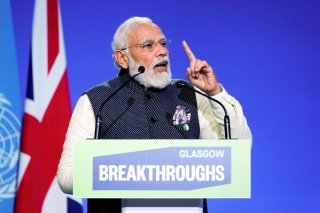India Takes a Stand for the Developing World at COP26
Eastern states—having just become recently independent from colonial hardship—will require additional time to “phase out” fossil fuels.
As much of the world’s media geared its attention towards the UN’s Climate Change Conference, or the 26th Conference of the Parties (COP26) this past weekend, India’s opposition to abandon fossil fuels hit a stumbling international roadblock.
Since President Joe Biden was inaugurated in January, climate change has been a primary agenda for the current administration. The Conference’s 26th iteration was held in Glasgow for a period of two weeks and offers Biden a larger platform to combat the vital long-term challenges of global warming.
During the summit, Western states pledged to reach carbon neutrality by 2050. On the other hand, Indian prime minister Narendra Modi advocated reaching this target by 2070—making it the first time a leader from Delhi set such an objective.
Modi asserted five commitments, or panchamrit—adapted from a mixture of five foods in Hindu and Jain worship—to combat climate change. They include achieving net-zero carbon emissions by 2070; bringing India’s renewable energy capacity to 500GW by 2030; reducing the economy’s carbon intensity to forty-five percent by 2030; attaining fifty percent renewable energy by 2030; and reducing one billion tons of carbon emissions by 2030.
Meanwhile, China has announced plans to cut carbon emissions by 2060, a decade before India. China, the United States, and EU are currently the largest carbon polluters—putting Delhi in fourth place. China and India both have a population of over 1.4 billion.
Both states are also newly independent compared to nations in the Western world. India became a sovereign state in 1947 following Britain’s departure. In her mere seventy-four years of existence, India today is on par with the United States to include two of the ten largest solar farms in the world and its ongoing mass tree planting campaign to plant hundreds of millions of saplings to reduce carbon emissions.
As Western states have been developing for centuries, going back to the industrial revolution in the 1880s, they are able to become effective leaders to achieve carbon neutrality. However, eastern states—having just become recently independent from colonial hardship—will require additional time to “phase out” fossil fuels. Granted, India can do more now to optimize this process, especially as it refrained from signing one of the COP26 deals to reduce emissions of methane gas.
From India’s perspective, a gradual reduction of carbon emissions would be more sustainable as close to 200 million people currently reside in absolute poverty in the country, living under $1.90 per day. India has a long way to go to address its population’s more immediate needs ranging from shelter, access to sanitary water, and primary education.
The lack of such necessities prevents India from realizing a more optimal workforce. Women also traditionally get married despite succeeding in civil service examinations and pursuing higher education.
Therefore, the Western world should practice patience with the developing world, especially economies that are growing as quickly as India and Brazil. Under Modi, India is embracing the principles of free-market capitalism although the ruling Hindu nationalist party is shaking the secular foundation of the nation.
Asking the developing world to abandon fossil fuels overnight is similar to asking a cigarette fanatic to quit smoking cold turkey.
Sustainable measures must be undertaken instead. For the smoker, nicotine patches and practicing good habits can pave the way to successfully remove the addiction. For greenhouse gas emitters alike, a sustained generational effort must be initiated to sufficiently phase out non-renewable energy sources especially in the developing world where people’s livelihoods are solely dependent on fossil fuels.
A phasing-out plan like the one Modi fought for would ensure less opposition to a fundamental change in a nation where advanced education is less prevalent. The instance of the 2020 farmer protests is one such example.
Farmers vehemently opposed Modi’s free-market reforms in the agricultural reforms as they feared becoming dependent on large corporate firms, which would go against their generational practice of family-run farms. The Delhi government is currently at a deadlock with the protests.
Climate change will create irreversible environmental damage to the sub-continent with exacerbated heat waves, droughts, and monsoon rain if the Indian government does not enact appropriate changes. The fact that India signed and ratified the Paris Agreement in 2016—an international agreement to limit global warming to 2 or 1.5 degrees Celsius compared to pre-industrial levels—is a sign of promise.
COP26 provides the next avenue for India to genuinely pursue a gradual reduction plan to achieve carbon neutrality. Western states must diplomatically nudge Delhi to keep the promises pledged by Modi at the summit.
Saba Sattar is a doctoral candidate of Statecraft and National Security at the Institute of World Politics in Washington D.C. She specializes in security challenges in the Indo-Pacific region across the conflict continuum, from addressing the totalitarian Islamist phenomenon to Chinese geoeconomic ambitions. She holds an M.A. in Statecraft and National Security Affairs, along with a B.A. in International Affairs and B.S. in Criminology from George Mason University.
Image: Reuters

